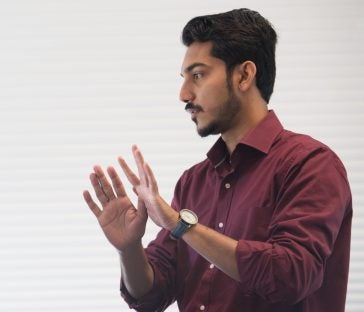 2015 was a deadly year in Pakistan.
2015 was a deadly year in Pakistan.
The country was gripped by a severe heat wave that claimed the lives of 1,300 people. It started with the scorched days in Karachi. News channels tirelessly slammed the government for its lack of preparation to tackle nature’s fury. Very few people understood that this crisis was not simply a local event, but the result of a global phenomenon: climate change.
It was high time to realize the importance of environmental reporting, which led me to apply for Metcalf Institute’s 2016 Annual Science Immersion Workshop for Journalists. My application to Metcalf was not decorated with scores of environment stories. Instead, I made the case that, while some applicants might want this training opportunity, my newsroom and I needed it.
The environment is not even considered a proper beat at many Pakistani news organizations. That fact alone says a lot about how casually environmental issues are viewed here. Journalists do not have awareness, training or resources to cover this beat, which is linked to human survival. Knowing that the Metcalf Fellowship is among the most competitive, I hoped that Metcalf would recognize our need and invest in Pakistan’s environmental news coverage. They did.
Being the first Pakistani journalist to attend Metcalf Institute’s Annual Workshop made me so proud. The approach Metcalf used to bridge the gap between scientists and journalists was very effective. We talked with researchers, learned how to interpret scientific journal articles and shared our perspectives on what makes a story newsworthy. I realized if scientists and journalists could learn how to work together, they could do wonders.
Back home I put those skills to work at Geo News as I interviewed scientists, and the outcome was higher-impact journalism. Whether I was writing about sea level rise and coastal flooding or the scarcity of ground water, Metcalf’s training helped me cover these stories more effectively.
Even three years after this once-in-a-lifetime experience, I cannot overemphasize the value of Metcalf’s alumni network. In 2017 I wrote to the alumni listserv about climate change repercussions in Pakistan, urging my fellow alumni to explore these effects in their own reporting and offering to provide any needed assistance. A very learned and senior alumna from the Israeli newspaper, Haaretz, offered to collaborate on a feature story about climate change impacts with me. The irony is that our countries do not share diplomatic ties. We knew it would have been difficult for us to publish a joint byline. We resolved it by publishing the story separately with our own bylines and a few changes to the script and title. For me it was the perfect example of what we call “reporters without borders.” We made it possible because of Metcalf Institute.
I don’t know if Metcalf realizes the value of my training experience, but I think about my days around Narragansett Bay with every single environment story.
Read More Alumni Profiles